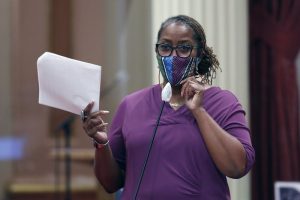Black Americans are more likely to suffer from diabetes, heart disease and other serious chronic health problems.
That’s why U.S. Senator Kirsten Gillibrand (D-NY), said she recently introduced legislation calling for $50 million in federal funding to help expand health care for underserved communities.
Gillibrand talked about the bill on Wednesday, at Great Harvest Church on Driving Park Avenue in Rochester.
“A vast majority of the city of Rochester has been designated as a health professional shortage area, which means there’s an acute shortage of primary care providers,” said Gillibrand. “With doctors in short supply Rochester residents are at a higher risk of hospitalization.”
The Senior Pastor at Great Harvest, Sebrone Johnson, said that coming to their church to talk about a health equity issue, was an appropriate thing to do on Juneteenth, a holiday that talks about freedom and equity.
“There’s no better day to announce something like this, that it should have happened before, but even late in the game, that now we have access to something greater,” said Johnson, “so I think this is the perfect day to announce anything related to equity.”
Sponsor Message
Johnson said there is a natural tie-in with these discussions about health care and churches, since those churches often have the trust of their parishioners.
Similar feelings were expressed by Wade Norwood, CEO of the regional nonprofit, Common Ground Health.
Norwood said that, “The regional surveys we’ve done, trust continues to be a very important element in bridging the gap between community and care, and the clergy remain trusted figures.”
Johnson said the federal funding Gillibrand is pushing for would be welcome at his church. He said they have already helped connect their church members with health services, but but outside funding is necessary for basic operations.
“To heat this, to air condition this, (the church building), to provide security for this, to market this, it costs real dollars,” said Johnson. “So for the Senator to say, we’re going to provide funding, so you can have proper staff and pay some of the soft costs, it means everything to churches who are trying to provide for the neighborhood.”




